- Home
- Elizabeth Gilbert
Pilgrims Page 6
Pilgrims Read online
Page 6
leave me alone.”
At this, Carl said, with no malice or heat, “You’ll want to get
home now, Art.” He said it the way Roy’s doctor a year before
had said, “You’ll want to stop eating salt soon.” He said it the
way Roy’s wife used to tell Emma, “You’ll want to have a warm
coat with you this morning.” A quiet command.
And Artie did leave, as if admonished by his own father,
swearing under his breath but obedient.
Carl knelt by Pete and said, “He’ll be okay. Just a bad bump
is all.”
“I’m really sorry,” Alice repeated, and then she asked, “Could
we take him somewhere, do you think?”
“We’ll go to my house,” Roy said. When he got up, he was
surprised to find that his legs were shaking so much that he had
to lean against the bar for a few moments before he could walk.
The three of them lifted Pete and half-carried him out the door,
down the steps, to Roy’s car.
“Put him in the back seat,” Roy instructed, and Alice said,
“His nose, though. He’ll get blood everywhere.”
✦
45
p i l g r i m s
“That’s okay.”
As they slid Pete into the car, he opened his eyes for a
moment, focused with difficulty on Alice’s face, and said, “Mom
told me —”
“Shut up, Pete. Will you please just shut your mouth?” Alice
interrupted, and Roy thought that she might start crying, but
she didn’t.
“Got more than you bargained for, Roy.” Carl laughed.
“I can’t tell you how sorry I am about all this,” Alice said
again, but Roy only walked her to the passenger side and helped
her into the car, as he had helped Pete.
They drove. West, out of Verona, the sun had just finished
setting without ceremony, without color or effort. It was dusk,
and still hot. Alice apologized again, and Roy told her that it
wasn’t her fault.
“All my brothers are idiots, all of them. My mom said I’m the
only one in the family who could think my way out of a used
tissue.”
“How many brothers do you have?” Roy asked. The question
sounded inane to him, considering the circumstances, but she
answered immediately.
“Five,” she said. “Steven, Lenny, Judd, Pete, Eddie.”
“And you.”
“And me. All of them are in the army but Pete and Eddie,
who are too young. Eddie’s only six. My brothers can’t do a
thing right.”
They drove in silence through the sunflower fields. Roy
thought to tell Alice that sunflowers always face east in the
morning, west at dusk. He thought it might interest her, or even
help her out, should she ever happen to get lost in North
Dakota. She didn’t seem to want to talk, though, so he kept it to
himself. They passed the white truck, parked in a ditch, without
commenting, and Alice spoke again.
“My littlest brother, Eddie, almost died last year,” she said.
46 ✦
Alice to the East
“He almost died. He was staying at our neighbor’s house and it
caught on fire. Everyone got out of the house but him, and
when the fireman came into his room, Eddie hid under the bed.
He got a glimpse of that oxygen mask and figured a monster
was coming after him.”
“That’s too bad.”
“It turned out fine. They found him and everything, and he
was okay. But when they told me what happened, the first thing
I thought was what a stupid kid my brother was, already. He’s
only six, I know, but to hide from a fireman in the middle of a
fire . . . The thing is, if he’d died, I wouldn’t’ve thought that he
was stupid. I just would’ve missed him. There’s a big difference,
I guess, between almost dying and really dying.”
Roy nearly said, At your age you would think that, but it
sounded bitter even to him, so he didn’t answer.
As he drove the familiar road, Roy thought about the empty,
ruined homes of people he’d grown up with, people who were
now gone: dead, or almost dead. Which Roy thought might
very well be the same thing. Verona itself was almost dead,
as well as countless other towns he’d known just like it. He
thought about his wife, who had almost died twice before the
final heart attack killed her. “I’m cold,” his wife had said, having
walked without shoes or a coat through the January snow to the
garage, where Roy was refinishing their dining room table. “I’m
cold,” she said, and then she died, not almost, but really. Now
Roy, with the bruised shoulder, with an unconscious boy in the
back seat of the car he’d purchased for his wife, with a girl
beside him half the age of his daughter, Roy felt as if he, too,
were very close to death, almost dead.
As if she had been following his thoughts all along, Alice slid
across the front seat and placed her hand over his. Her touch
was at once that of a mother, a lover, a daughter, and it was so
long since he’d known any of these things that Roy sighed,
allowed his head to fall forward. He shut his eyes. Alice reached
✦
47
p i l g r i m s
for the steering wheel, and he let her take it, knowing that the
road was straight and safe, and that, for now, it would be better
to let her steer.
“It’s okay,” she said, and reached under the wheel and turned
on the headlights. It was not yet dark, but the lights would help
them be seen by anyone driving east, or by anyone who might
be watching their progress as they crossed the empty plains of
North Dakota.
48 ✦
Bird Shot
✦
✦
✦
Gashouse johnson came for Tanner Rogers just be-
fore noon. He knocked on the Rogerses’ door and then
waited, pacing the porch and examining the carpentry.
His dog, Snipe, followed, limping like a man with a bullet in his
spine. Tanner’s mother, Diane, came to the door. She had all her
pretty blond hair pulled back away from her face.
“Diane,” he said.
“Gashouse.”
“I want to take Tanner with me to the pigeon shoot today.”
Diane raised her eyebrows. Gashouse waited for an answer,
but she didn’t give one.
“I think he’d like that,” Gashouse said. “I think he’d like to
see a pigeon shoot.”
“He doesn’t go,” Diane said.
“I’d sure like to take him, though. On account of his father.”
“He never went. Not with his father, either.”
“What is that, Diane? A rule of your house or something?”
“It might be.”
“Come on, Diane.”
“I think it’s a sick thing. I really do. I think pigeon shoots are
sicker than hell.”
✦
49
p i l g r i m s
“You used to love it.”
“I never loved it. I never once loved it.”
“You used to go.”
“I did used to go. But I
never loved it.”
“Ed loved it.”
“Tanner doesn’t go,” Diane said again. “He’s not even inter -
ested in it.”
“There are people up there who love Ed. A boy should meet
the people who love his father. It’s healthy for a boy to meet
people like that.”
Diane said nothing.
“I’m shooting for Ed today,” Gashouse said. “Until they find
someone else who can replace him permanently. Or until he
gets better, I mean.”
“That’s very nice of you.”
“I’m a good shot, Diane. I used to be a hell of a good shot
when we were kids.”
“Good.”
“Of course, I’m no Ed.”
“How many pigeons you plan on killing today?”
“Many.” Gashouse smiled. “I’m going to kill so many god-
damn pigeons. I’ll see to it that Tanner kills a ton of pigeons,
too.”
Diane nodded, tired.
“Hell, I’ll kill enough pigeons to make you a coat,” he said,
and then Diane did smile. Gashouse Johnson’s smile widened.
“How about it, Diane? Let me take your son up there and we’ll
bring you back a hell of a nice pigeon-fur coat.”
Diane looked past Gashouse Johnson to Snipe, who was
trying to lie down. “What happened to your dog?” she asked.
“He got old.”
“He looks like hell. He looks like he got run over.”
“He just got old.”
50 ✦
Bird Shot
“It’s no place for dogs up there,” Diane said. “Not for dogs or
kids, either. Dogs get shot up there.”
“No. Pigeons get shot up there. Nobody never shot a dog or a
kid yet.”
“Ed shot a dog up there once for chasing dropped birds.”
“I don’t know anything about that.” Gashouse took out his
handkerchief and blew his nose.
“Gashouse,” she said, “do you want to come inside?”
“No, I won’t bother you.”
Snipe was lying down by a pair of boots near the porch steps,
chewing on his tail. His head was thick and brown as a boot
itself, and while he chewed, he watched Diane. His dog face
was void.
“How old is he?” Diane asked.
“Eleven.”
“Just the same age as my Tanner.”
“I hope your boy is holding up a little better than my dog.”
Diane smiled again. They looked at each other. After a
moment, she asked, “Did you go see Ed in the hospital?”
“This morning.”
“Did he tell you to come here and check on me? Is that it?”
“No.”
“Did he tell you to spend some time with Tanner?”
“No.”
“What’d he say?”
“Ed? He said, ‘You think the first cigarette of the day
tastes good? Wait ’til you try the first cigarette after a triple
bypass.’”
This time Diane did not smile. “He told me that joke, too,”
she said. “Except that I don’t smoke.”
“Me neither. I chew.”
“Well,” Diane said, “I drink.”
Gashouse looked down at his hands. Took a long look at his
✦
51
p i l g r i m s
thumbnail. Diane said, “You’ve got something on your beard. A
crumb or something.”
He wiped it off. He said, “Could’ve been toast.”
“It looked like a piece of fluff.”
“What’s Tanner doing right now, Diane? Come on, Diane.
Why don’t you go ask your son if he wants to come along on a
real live pigeon shoot?”
“You are an optimistic man, Gashouse. That’s what you are.”
“Come on, Diane. What’s he doing right now?”
“Hiding from you.”
“He’ll love it,” Gashouse said. “Unless he gets shot . . .”
“He might not even want to go, ” Diane said, and Gashouse
replied, “Ask him. Just go ask him.”
Later, Tanner Rogers and Gashouse Johnson drove through
town in Gashouse’s truck. The boy was dressed in a heavy
winter coat, a red hunting cap, lace-up boots. He was shy, and it
took him some time to ask Gashouse the question he had been
privately nursing.
“Isn’t it against the law? To shoot pigeons?”
“Nah,” Gashouse said. “Shooting pigeons is not against the
law. Betting on people who shoot pigeons is against the law.”
“What about my dad?”
“Your dad? Why, he doesn’t bet. He just shoots the pigeons.
Everyone bets on the shooters. You see? Everyone bets on your
father, to guess how many pigeons he can shoot. Your dad don’t
need to bet.”
“What about you?”
“I bet like a son of a bitch. What about you?”
Tanner shrugged.
“How much money do you have on you, son?”
Tanner took a handful of linty change from his pocket. “Dol -
lar eighteen.”
“Bet it all,” Gashouse said. Then he laughed and yelled,
52 ✦
Bird Shot
“Double it!” He slammed his hand on the steering wheel.
“Double it! Triple it! Ha!”
Snipe barked once, a hound’s low woof. Gashouse spun his
head and looked at Tanner, suddenly serious. “You say some-
thing, boy?”
“No,” Tanner said, “that was your dog.”
Gashouse leaned forward and wiped the inside of the wind-
shield with his sleeve. “Son,” he said, “I was just kidding with
you there. That was my dog barking. I knew that.”
“Sure,” Tanner said. “Me too.”
“Good boy. We all had a little joke, right?”
“Sure,” Tanner said. “Okay.”
On their way out of town, Gashouse stopped at Miles Spi-
vak’s grocery store to buy shotgun shells. Miles himself was
behind the counter, looking wintry and old. He found the shells
that Gashouse asked for.
“Miles!” Gashouse shouted. “I’m shooting for Ed Rogers
today. You should come on up there for once. You might have a
good time, Miles! You might see some hell of a good shooting
from me.”
Miles took a slow look around his store, as if expecting to see
another person appear behind him. “Damn it, Gashouse. You
know I’m the only one here. You know I can’t go.”
“But I’m shooting today, Miles! Worth closing early for. I
used to be a hell of a good shot.”
Miles considered this.
“You know Ed’s boy?” Gashouse put a big hand on Tanner’s
head.
“Have five boys myself. Just had the last one two months
ago. By cesarean. You ever seen one of those?” Miles asked
Tanner.
“For Christ sake, Miles,” Gashouse said. “He’s just a kid.”
“Tied her tubes right there. So we won’t have another kid.
Now that’s something to see, to see your own wife laid open like
✦
53
p i l g r i m s
that. Women got some pretty tiny equipment inside. Ever seen
those little things? Ever seen those little tubes?”
“Jesus Christ, Miles,” Gashouse said. “Wouldn’t you be sur-
pri
sed if the kid said yes?”
“Damnedest things,” Miles said. “Tiniest, damnedest things
you ever saw.”
“Let’s get out of here, Tanner,” Gashouse said. “We got a
crazy man!” As they walked to the door, Miles called after them,
“She’s a wonderful woman, my wife!”
“I’ll tell you something about that one,” Gashouse said when
they were outside. “He’s too dumb to bat both his eyes at the
same time.”
When they were back in the truck, Gashouse took the box of
shotgun shells from his pocket and read the label carefully.
“Hell,” he said, “I don’t know.” He turned the box over and read
it again.
Tanner waited, then asked, “What kind of gun do you have?”
“Twelve gauge.” He looked over. “Does that mean anything
to you?”
“My dad has a double-barreled eighteen gauge.”
“Sixteen gauge,” Gashouse corrected, putting the shell box
back in his pocket. “Ed’s got a double-barreled sixteen gauge.
It’s been a long time, son. I’ll tell you that right up front. It’s
been a hell of a long time since I shot a gun.”
Gashouse sighed, then slammed the steering wheel again.
“Hey! But come on! It’s not even my gun! It’s Dick Clay’s
gun! Ha!”
Snipe woofed again from the floor.
“I didn’t say anything,” Tanner said.
“Ha!” Gashouse slapped his own knee. “Ha! You got the joke,
son! You got it!”
Gashouse started up the truck and pulled out of the parking
space. He said, “Good thing you like a joke, because we’re on
54 ✦
Bird Shot
the road to big fun today, that’s for sure. Any questions up there,
you just ask me.”
“Why do they call you Gashouse?” Tanner asked.
“Farts,” he answered without hesitation. “Some real wood-
chippers, too. Real ice-breakers. I’m better now, though, than I
used to be. No more dairy.”
“Does my dad call you that?”
“Yes.”
“Does my mom call you that?”
“Tanner,” Gashouse said, “it was kind of a consensus. You
know what a consensus is?”
“No.”
“Well,” Gashouse said, “that’s what it was.”
At the next stop sign, Gashouse rolled down his window and
yelled to a red-haired woman on the sidewalk, “Hey there! Hey
there, you little stack of pancakes!”
She smiled and tossed out a wave as if it were a candy
wrapper.
“Hey there! Hey there, you little side of fries! Hey there, you

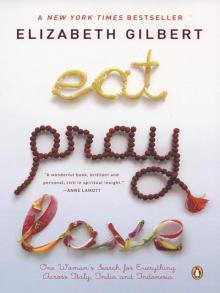 Eat, Pray, Love
Eat, Pray, Love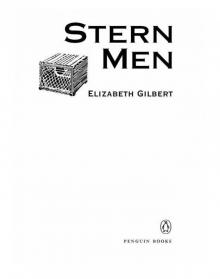 Stern Men
Stern Men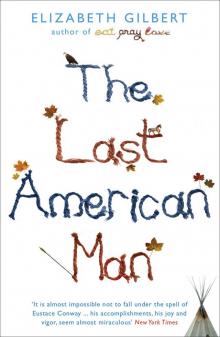 The Last American Man
The Last American Man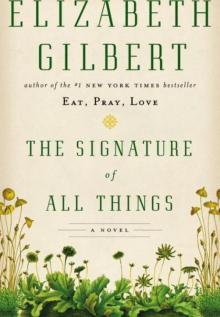 The Signature of All Things
The Signature of All Things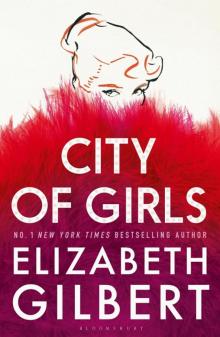 City of Girls
City of Girls Pilgrims
Pilgrims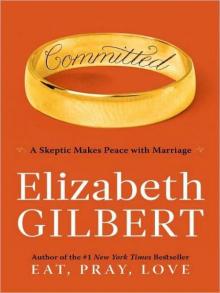 Committed: A Skeptic Makes Peace With Marriage
Committed: A Skeptic Makes Peace With Marriage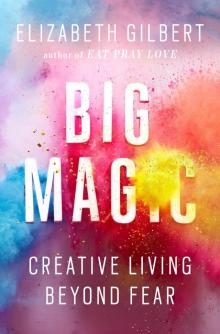 Big Magic
Big Magic Committed
Committed The Best American Travel Writing 2013
The Best American Travel Writing 2013